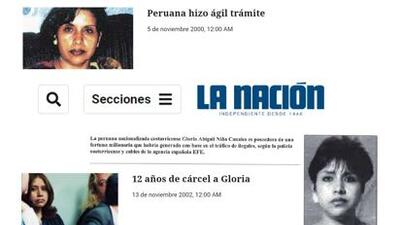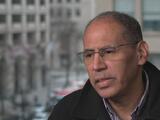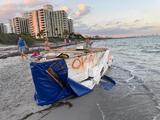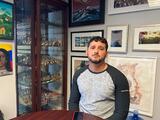He helped capture the 'Queen of the Coyotes', but he's lived in the shadows ever since waiting for the promise of a Green Card.

Two decades ago, Roberto Rivas played a crucial role in busting one of the largest global passport trafficking rings in the hemisphere.
But today, the 65-year-old Peruvian is an undocumented alien in a country that seemingly forgot its debt to him, and the promises agents gave him when he volunteered to infiltrate the inner circle of Gloria Niño Canales, aka the ‘Queen of Coyotes’.
“They have made me suffer a lot here. They cast me off like a stray dog. I worked hard, I risked my life,” says Rivas, who now lives in San Antonio with his Peruvian wife and children.
In the late 1990s, Rivas was living in San Jose, Costa Rica, working as a security guard for the Peruvian ambassador when he learned of a major fraud case involving Niño Canales, a Peruvian-born woman who had become the target of a major U.S. investigation, Operation Broken Mirror.
He dedicated the next two years to infiltrating the ring run by Niño Canales and her husband out of their large home in San Jose, Costa Rica, first as a painter and then as a trusted chauffeur. At great personal risk, Rivas stole and copied scores of personal documents from the couple’s fax machine that would be used to prosecute the couple.
Passport fraud in Cosa Rica
They were separately accused in the United States and Costa Rica with smuggling 10,000 people into the United States from Latin America, Asia and the Middle East, with the help of a network of corrupt government officials in several countries, including the Cosa Rican passport office.
In 2002, Niño Canales was sentenced to 12 years in jail for human trafficking by a Costa Rican court. Her husband, Dario Espejo-Flores, was also indicted and later pled guilty in federal court in Texas.
According to congressional testimony by James Ziglar, the former head of the Immigration and Naturalization Service (INS), Broken Mirror was one of the most successful human smuggling initiatives at the time. The leaders of the ring were among the Top 10 U.S. government targets, he told the National Commission on Terrorist Attacks Upon the United States, also known as the 9-11 Commission, which investigated the September 11, 2001 airline hijackings, which killed almost 3,000 people.
In the wake of 9-11, the U.S. launched the invasion if Iraq. “Alien smuggling organizations […] are becoming increasingly sophisticated and are known to be very brutal,” Ziglar told the commission in January 2004. “They present a serious security risk to the United States becauseof their willingness and ability to smuggle dangerous criminals and terrorists,” he added.
Despite that threat, and Rivas’ direct role in helping the U.S. agents take down a major smuggling ring, in 2004 he was struggling to be allowed to stay in the country.
Rivas hoped to be rewarded with a visa and Green Card
Rivas says he was promised U.S. protection as a confidential informant and a new life in the United States after the U.S. government flew him to Texas in 2001 on a special visa, known as Significant Public Benefit Parole (SPBP). Part of the agreement was for him to testify before a grand jury examining evidence against Espejo-Flores.
Despite his testimony, he was never given permanent residency and was placed in removal proceedings in 2009. He also has two children who are currently enrolled in the DACA program for the children of undocumented migrants.
An ICE spokesperson declined to comment about Rivas’s role in Operation Broken Mirror and said all decisions regarding “noncitizens placed into removal proceedings” are the responsibility of federal judges in the immigration courts.
Broken Mirror was a “huge case” agents recall
However, thanks to documents provided by Rivas and his attorney, Univision was able to locate two retired DHS agents who worked on Broken Mirror, both of whom remembered the crucial role played in informants in the case. While neither of the agents met Rivas, one of them recalled observing him during the undercover operation.
“I remember seeing him. He set up the meeting in the mall where Gloria (Niño Canales) was arrested. I saw the whole thing go down,” said A.J. Irwin, a 65-year-old retired DHS agent who spent 30 years with the agency.
Irwin was sent to Costa Rica to help coordinate the operation with the local Costa Rican authorities.
“The case was huge,” said Irwin, who is 65 now. “Niño Canales had a sophisticated operation. Everybody told me they were sacred of her. She was ruthless,” he added.
Irwin’s boss at the time, Hipolito Acosta, who was the director of the INS office in Mexico City, confirmed that Broken Mirror was a landmark case that relied on at least three key informants.
“Dario (Espejo-Flores) had an operation in Cancun. They were listed by CIA as the top human smugglers in Latin America,” said Acosta, 69, who is also retired and is one of the most highly decorated officers in the history of U.S. Customs and Border Protection (CBP). He is also the author of three books, including a memoirs of his undercover work, Deep in the Shadows.
Niño Canales had slipped through the hands of authorities in 1995 when she was arrested in Ecuador and deported to Honduras where she was wanted on smuggling charges.
A multimillion dollar smuggling ring: 10,000 passports
At the time of her first arrest the Washington Post reported that authorities has “broken up a major smuggling operation that used a sophisticated network and extensive bribery to funnel thousands of Asians and Latin Americans to the U.S. through Central America.”
The multimillion-dollar businesses was smuggling as many as 10,000 people a year, charging $6,000 a head.
A raid on her mansion in Honduras found documents and computer records implicating senior officials of various governments, including military and immigration officers, as well as a network of coyotes and airline official and hotel owners.
But Niño Canales escaped and set up operations in Costa Rica where she enjoyed high level protection.
But U.S. agents were able to build a new case against her there working with Costa Rican intelligence agents.
Recruited at a soccer game
Rivas heard about the operation through his embassy friends who he played soccer with at weekends.
“She was a famous mafiosa,” he said.
Rivas recalled a conversation with the head of security at the U.S. embassy during which they discussed the possibility of using his Peruvian identity to infiltrate her organization.
“The head of security told me that this person was a thorn in the side of the U.S. government. ‘If you manage to contact her and infiltrate her (organization), you can ask whatever you want'," Rivas said he was told.
Rivas was attracted to the idea. He’s had some experience of working undercover, both as a policeman and before than during a spell working in the Colombian coca fields.
"I just bummed around in her neighborhood looked for work," he said. He got a job painting a large fence surrounding the Niño Canales large mansion. Then he did some landscaping. After winning the confidence of Espejo-Flores he was hired as a driver.
“That was my mission, to get inside (the house),” he said.
One he had accessto the house he began to collect evidence, sneaking into the office where a fax machine became a valuable source of documentary evidence. He was also asked by the couple to deliver packages and pick up documents which he made copies of.
“I got a lot of evidence and I showed them (Costa Rican intelligence) everything. They were impressed that I got in," he said.
Rivas’ undercover identity revealed
He collaborated on the operation in Costa Rica for 14 months and helped to set up her arrest at a San Jose mall on November 1, 2000. He also testified at her trial. Although he had been assured his identity would be kept anonymous, he was horrified to learn before the trial that she had somehow discovered who had betrayed her.
Costa Rican intelligence services arranged for him to be taken to a safe house before the trial began.
At the conclusion of the trial, his cover blown, Rivas says Nino Canales confronted him and told him he was “a dead man.”
Meanwhile, U.S. officials offered to take his family to the United States if he agreed to testify against Espejo-Flores.
He says he was promised $25,000 and given plane tickets. He was given a $5,000 advance, half in cash and the other half wired to his family in Peru.
“They put me on the plane and told me ‘Ciao, goodbye’.”
Agents would be waiting for him when he landed in Houston. But no one met him off the plane.
Some of the INS agents who worked on the case tried to help Rivas, according to documents Rivas’ attorney shared with Univision. Joe Banda, the supervising agent in Honduras wrote to his bosses on October 10, 2001 requesting a six-month extension of the public benefit parole for Rivas and another informant, Richard Zurita, as well as work permits.
Agents concerned about safety of Rivas and another informant
They were “a valued source of information” on international human trafficking and were “actively working […] on an ongoing alien smuggling investigation that has targets throughout these jurisdictions and beyond,” Banda wrote.
He also wrote that Rivas and his family feared for their and needed to be kept far away from Nino Canales and her alien smuggling associates. “During the investigation, associates of the alien smuggling organization have visited and threatened the subject's family members in Peru. Other areas in the Central American region and/or Mexico are not suitable to protect the subjects and their family, in that the smuggling organization is located in these areas,” Banda wrote.
The alien smuggling operatives that Rivas and Zurita had infiltrated were “known to engage in violent behavior against those who are believed to be violating the trust of the organization. This information has been corroborated by intelligence received from other reliable sources,” he went on.
Espejo-Flores arrested
While in the United States, agents were able to set a trap for Espejo-Flores in Panama, with the help of another informant, Carlos Martinez, from where he was extradited to the United States.
Rivas was flown to Washington DC in to testify before a grand jury on October 17, 2021. He provided Univision with a copy of the subpoena to testify and his plane ticket.
But soon after his visa ran out.
“Every time he inquired about the Green Cards for him and his family, he was told the process would take some time but that eventually they would get their legal status,” according to his lawyer Veronica de la Fuente.
“The ball was dropped somewhere along the way” – Rivas deserved an ‘S’ visa
Agents Acosta and Irwin say too often in their careers they experienced cases where valuable informants were let down by the agency they assisted. They put it down to “negligence” and “laziness” on the part of agents who were often too busy advancing their own careers to file the paperwork to honor promises made to the informants who brought them success.
“We loved to do cases, but we cared about the people we worked with. We were a bit different,” said Acosta, who said he always pushed hard to get fair treatment for deserving informants.
Irwin and Acosta were not aware of Rivas’ immigration predicament until informed by Univision.
“The ball was dropped somewhere along the way,” said Acosta. “I don’t have the reports (on Rivas’ role in Broken Mirror). But there were not a lot of informants at this level. I would have supported his case for an S visa,” he added, referring to a special class of visa for persons who assist law enforcement.
Rivas has spent the last 20 years living in the shadow of U.S. immigration laws and working in home remodeling.
For years Rivas searched for a lawyer who would take on his case but was told it would be too difficult and expensive to win. But in 2018, he found a lawyer in San Antonio, de la Fuente, who was willing to take on the case at a reduced rate.
In 2018 she wrote to DHS requesting that Rivas be granted an S-5, a visa category for persons who supply critical information relating to a criminal organization. Ironically, the S-5 visa was created by Congress on October 1 2001 in response to the September 11 terrorist attacks.
“On behalf of Mr. Rivas and his family, I request this department to recognize Mr. Rivas his service to this country, honoring what he was promised and what in justice is appropriate,” she wrote.
She is still waiting for an answer.



